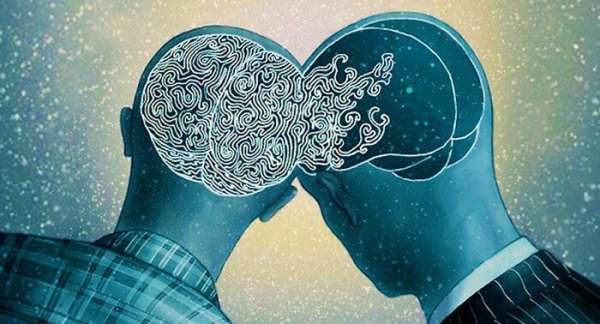Hyper-Empathy Syndrome: Too Much of a Good Thing


Written and verified by the psychologist Valeria Sabater
It’s like people with hyper-empathy syndrome have long antennas that pick up on every emotion vibrating around them.
But they end up losing themselves in other people’s needs and poisoning themselves with too much compassion, even feeling guilty for the pain that others experience. It is painful and exhausting.
Maybe you’re surprised this is a “syndrome.” Are we going overboard by labeling apparently “normal” behaviors pathological?
The answer is no, and there’s an explanation for it. If the DSM-V labels hyper-empathy as a characteristic of personality disorders, then it’s for a good reason.
“To perceive is to suffer.”
-Aristotle-
Any behavior that makes it harder to relate to other people, causes suffering, and prevents you from living a normal life needs a diagnosis and some kind of treatment.
Therefore, people with too much empathy, or hyper-empathy, who show a persistent pattern of distress and inability to function in their social, personal, and professional lives, show signs of a personality disorder.
Now, it’s important to clarify that there’s a difference between being really sensitive and having hyper-empathy syndrome.
For example, in the interesting book Women Who Love Psychopaths, psychiatrist Sandra L. Brown talks about how many women not only understand the psychopathic behavior of their partners, they even end up justifying it.
In other words, their excessive empathy completely prevents them from clearly seeing the predator in front of them. In fact, they use incredibly sophisticated, clever ways to justify their partners’ violent acts. This is clear evidence that hyper-empathy syndrome is a disorder worth thinking and talking about.

Empathy and hyper-empathy, the fine line between balance and pathology
If empathy is a positive, useful, and desirable attribute, then you may think there’s nothing wrong with having “too much” of it. But like everything in life, excess is never good, and it’s best to have a healthy balance.
Hyper-empathy affects your ability to separate yourself from other people. Empathy is putting yourself in someone else’s shoes. But it’s important to specify that when you do so, you never stop being yourself.
It’s also important to recognize the different types of empathy you may experience, which ones are healthy, and which may cross into pathology.
- Affective empathy: This has to do with the ability to feel the emotions and feelings that someone else is experiencing and have compassion for them. You feel how they feel.
- Cognitive empathy: This gives you more complete and exact knowledge about the content of the other person’s mind. You know and understand how they feel.
- Excess empathy, or hyper-empathy: This involves being both a mirror and a sponge. Not only do you feel what the other person feels, but you suffer from it. It’s a physical pain that causes anxiety and subjects you to their needs. You can’t see where you end and they begin.

What is it like to have hyper-empathy syndrome?
Below, we’ll describe the characteristics of people with hyper-empathy syndrome to help you distinguish between emotional sensitivity and pathological hypersensitivity. In addition, it will show you how the DSM-V identifies these behaviors.
- First, they experience a breakdown of their identity and social skills.
- It’s common for them to develop other disorders with compulsion and psychosis.
- They tend to have mood swings, going from deep depression to histrionic, unbridled happiness.
- They’re patient and dependent. They want to solve everyone’s problems to reinforce the image they want to project of being valuable and needed. They need constant interaction and validate themselves by doing favors. If someone tries to set boundaries on them, they feel hurt and rejected.
- Also, they’re often overprotective and undermine other people’s autonomy.
- The excess empathy gives them serious trouble being productive at work. They feel like nobody understands their altruism, their need to support and help others.
- Last but not least, you often see them move from excessive empathy to resentment. They’ve suffered so much disappointment that they end up isolating themselves, submerged in rage and despondence.

What can you do if you have too much empathy?
At this point, most of you are probably wondering causes someone to suffer so much by taking on other people’s emotions. Well, there has been a lot of progress on the subject in recent years. In fact, researchers are discovering the genetic and neurochemical basis of hyper-empathy.
Researchers are learning a lot from so-called empathy spectrum disorders, such as Asperger’s syndrome, hyper-empathy syndrome, and borderline personality disorder. It’s an interesting subject that will give significant answers and better treatment approaches in the next few years.
For now, if you suffer from too much empathy, the answer couldn’t be more simple: seek professional help.
Whether you’re at the most pathological extreme of empathy, or you’re simply hypersensitive, it’s always a good idea to learn techniques that can help you set limits, have more control over your own thoughts, take better care of your own needs, and more accurately define your own identity and self-esteem.
Don’t forget that excessive empathy doesn’t just make you upset. It also separates you from the rest of the world.
It’s not worth it to cling to a world of persistent emptiness and torment. Take the first step.
It’s like people with hyper-empathy syndrome have long antennas that pick up on every emotion vibrating around them.
But they end up losing themselves in other people’s needs and poisoning themselves with too much compassion, even feeling guilty for the pain that others experience. It is painful and exhausting.
Maybe you’re surprised this is a “syndrome.” Are we going overboard by labeling apparently “normal” behaviors pathological?
The answer is no, and there’s an explanation for it. If the DSM-V labels hyper-empathy as a characteristic of personality disorders, then it’s for a good reason.
“To perceive is to suffer.”
-Aristotle-
Any behavior that makes it harder to relate to other people, causes suffering, and prevents you from living a normal life needs a diagnosis and some kind of treatment.
Therefore, people with too much empathy, or hyper-empathy, who show a persistent pattern of distress and inability to function in their social, personal, and professional lives, show signs of a personality disorder.
Now, it’s important to clarify that there’s a difference between being really sensitive and having hyper-empathy syndrome.
For example, in the interesting book Women Who Love Psychopaths, psychiatrist Sandra L. Brown talks about how many women not only understand the psychopathic behavior of their partners, they even end up justifying it.
In other words, their excessive empathy completely prevents them from clearly seeing the predator in front of them. In fact, they use incredibly sophisticated, clever ways to justify their partners’ violent acts. This is clear evidence that hyper-empathy syndrome is a disorder worth thinking and talking about.

Empathy and hyper-empathy, the fine line between balance and pathology
If empathy is a positive, useful, and desirable attribute, then you may think there’s nothing wrong with having “too much” of it. But like everything in life, excess is never good, and it’s best to have a healthy balance.
Hyper-empathy affects your ability to separate yourself from other people. Empathy is putting yourself in someone else’s shoes. But it’s important to specify that when you do so, you never stop being yourself.
It’s also important to recognize the different types of empathy you may experience, which ones are healthy, and which may cross into pathology.
- Affective empathy: This has to do with the ability to feel the emotions and feelings that someone else is experiencing and have compassion for them. You feel how they feel.
- Cognitive empathy: This gives you more complete and exact knowledge about the content of the other person’s mind. You know and understand how they feel.
- Excess empathy, or hyper-empathy: This involves being both a mirror and a sponge. Not only do you feel what the other person feels, but you suffer from it. It’s a physical pain that causes anxiety and subjects you to their needs. You can’t see where you end and they begin.

What is it like to have hyper-empathy syndrome?
Below, we’ll describe the characteristics of people with hyper-empathy syndrome to help you distinguish between emotional sensitivity and pathological hypersensitivity. In addition, it will show you how the DSM-V identifies these behaviors.
- First, they experience a breakdown of their identity and social skills.
- It’s common for them to develop other disorders with compulsion and psychosis.
- They tend to have mood swings, going from deep depression to histrionic, unbridled happiness.
- They’re patient and dependent. They want to solve everyone’s problems to reinforce the image they want to project of being valuable and needed. They need constant interaction and validate themselves by doing favors. If someone tries to set boundaries on them, they feel hurt and rejected.
- Also, they’re often overprotective and undermine other people’s autonomy.
- The excess empathy gives them serious trouble being productive at work. They feel like nobody understands their altruism, their need to support and help others.
- Last but not least, you often see them move from excessive empathy to resentment. They’ve suffered so much disappointment that they end up isolating themselves, submerged in rage and despondence.

What can you do if you have too much empathy?
At this point, most of you are probably wondering causes someone to suffer so much by taking on other people’s emotions. Well, there has been a lot of progress on the subject in recent years. In fact, researchers are discovering the genetic and neurochemical basis of hyper-empathy.
Researchers are learning a lot from so-called empathy spectrum disorders, such as Asperger’s syndrome, hyper-empathy syndrome, and borderline personality disorder. It’s an interesting subject that will give significant answers and better treatment approaches in the next few years.
For now, if you suffer from too much empathy, the answer couldn’t be more simple: seek professional help.
Whether you’re at the most pathological extreme of empathy, or you’re simply hypersensitive, it’s always a good idea to learn techniques that can help you set limits, have more control over your own thoughts, take better care of your own needs, and more accurately define your own identity and self-esteem.
Don’t forget that excessive empathy doesn’t just make you upset. It also separates you from the rest of the world.
It’s not worth it to cling to a world of persistent emptiness and torment. Take the first step.
This text is provided for informational purposes only and does not replace consultation with a professional. If in doubt, consult your specialist.







